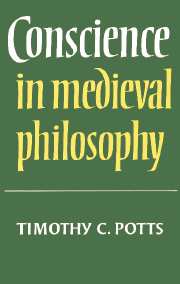3 - Bonaventure
Published online by Cambridge University Press: 06 January 2010
Summary
By the time of Bonaventure, it had become customary to divide treatises upon conscience into two parts, one devoted to synderesis and the other to conscientia. But Bonaventure and other Franciscan writers take conscientia first. In addition, Bonaventure does not draw the distinction between synderesis and conscientia in the same way as Philip. The first question in each section of his treatise has practically the same form: ‘Does conscientia belong to the thinking or to the desiring part of the soul?’ ‘Is synderesis to be classified with apprehension or with desire?’ Bonaventure's questions are thus apparently posed in relation to the Aristotelian distinction between the theoretical and the practical aspects of the soul but, when we delve into the details, Bonaventure's taxonomy turns out to be more complicated.
It will be best to approach this matter obliquely. First, Bonaventure does not appeal to any distinction between general and particular deontic propositions in order to differentiate synderesis from conscientia, though he does report Philip's view, without committing himself to it (2.1). Instead, he immediately quotes John of Damascus with approval to the effect that conscience is the law of our thought, since, says Bonaventure, ‘a law is what we recognise by means of conscientia’ (1.1). But this, for Bonaventure, does not distinguish conscientia from synderesis, for he tells us later (2.1) that both of them are related to natural law. However, he continues, natural law can be understood in two ways: first, as a set of injunctions, second, as a psychological disposition.
Information
- Type
- Chapter
- Information
- Conscience in Medieval Philosophy , pp. 32 - 44Publisher: Cambridge University PressPrint publication year: 1980
